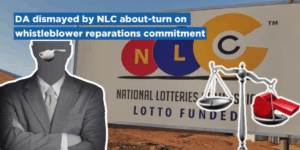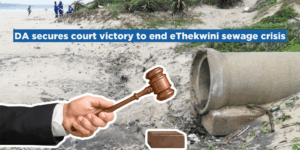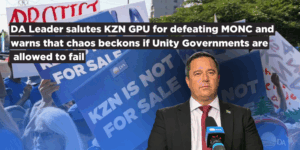Mining is seeing the proverbial green shoots of recovery. Improvements in international commodity prices mean that some mines have started making money and there is some optimism in the industry.
Unfortunately though, that conceals a gloomier picture. The commodity price increases look shaky – the difficulties of running a mine are escalating and capital is extremely hard to come by. Communities are increasingly angry that they are being disregarded. Rushing down on the industry are the twin salvos of new legislation and a new mining charter, both of which will be disastrous.
We all know that despite our sumptuous mineral endowment, mining investors rate us very low on the list of places to put their money.
What does that mean?
It means our capital investment in mining is half what it was in 2007 and 31% down on 2013. Right now people involved in mine financing tell me capital investment has dried up almost completely.
Because of that, in the last four years, our industry has lost 65 thousand jobs. Remember that for every actual mining job, there’s estimated to be one other in surveying, logistics or engineering.
The problem is the same as it has been under the ANC – poor legislation, poorly administered.
This department is a hopeless loser. It can’t pass legislation, anything it does get through is bad, it can’t administer properly and it keeps taking ridiculous decisions that result in it losing in court.
Take Section 54 safety stoppages. The industry complains. I complain in this House. They are being too broadly applied and there are adverse consequences for production and employment. The ANC tries to bludgeon me into silence, claiming I don’t care about workers. Nonsense, I care about safety and jobs, because if you don’t have a job, you and your whole family are vulnerable.
We know what we’re doing, says the administration. Anglogold takes the department to court. The department loses spectacularly. Section 54 has been too tightly imposed.
I assume since that loss the department is being more careful and production is up 15%. Looks like I was right all along and the ANC was wrong.
Another one that I brought up in two previous budget speeches was the Aquila case. Double granting of rights between a company which sank hundreds of millions into exploration only to find this government has granted rights over the same land to a shady government mining company which doesn’t mine. I was assured, in two budget votes, in this House, that the Department of Mineral Resources (DMR) has this in hand. Wrong. The DMR lost that case too.
So I will take anything I hear from the ANC in this debate with a large shovelful of salt, everybody else should too. The fact is, this administration suffers from a credibility crisis.
It lost in the North Gauteng High court over the Diamond Act, and the Constitutional Court is now considering that appeal. No matter which way it goes, we can be sure that this government’s attempts to fix the diamond markets, to the advantage of a few ANC aligned cronies will enrich a few but lead to the small mining, cutting and polishing sectors not recovering from the pit of destruction where the ANC’s stewardship has thrown them.
This department even loses in court against its own staff. Officials in its own Gauteng provincial office won against it in court when there was a senseless plan to reorganise it – people think that plan was for the benefit of some favoured cronies.
And this has been the pattern of the ANC’s stewardship of the mining industry since the beginning. It has focused on transferring mine and rights ownership on a racial basis. That’s valid, given our unequal past. But only up to a point. The ANC ignoring that policy comes at a cost.
The cost is lower profitability and predictability for the investors and less investment and fewer jobs. The ANC has sacrificed the interests of the many who work or who could work in mining for the interests of the few, a handful of BEE tenderpreneurs and other cronies of the ANC leadership.
So this administration fails in court. It also fails even to get to court.
Enforcement against illegal miners is laughable.
Miners in Welkom estimate ten thousand zama-zamas are underground on any one day!
Illegal chrome miners in Limpopo take an estimated million rand a day from sites that are easily visible and accessible. Police raid, but talk about problems with enforcement capacity and the mining goes on. The same sort of thing happens in the enforcement actions against illegal sand mining. To its credit, after some nagging, the department is starting to act in this area, but the actions are mostly pathetic.
For example, at Agate terrace near Port St Johns, the authorities act against sand miners and it stops for a day. When the authorities are gone it starts up again. Where are the miners in court and the confiscated equipment? There is a lack of will to enforce on the part of the department. The department is not serious and is not credible.
When the Hawks proudly told us they had taken action in illegal mining cases worth R200 million, it had to be pointed out to them this was less than five percent of what this government tells us is mined illegally every year. That’s hardly a disincentive against a trade that costs the country R6 billion a year in lost opportunities.
Instead of concentrating on how to stop illegal mining, the department spends its days drawing up more and more legislation and regulation that will make it more complicated and less profitable to mine.
So if it is unwilling and unable to enforce its writ, how does the DMR spend its time?
That’s a good question with a depressing answer.
Ideological foolishness has combined with procedural delays to give us a Mineral and Petroleum Resources Development Act (MPRDA) which is still winding its way through the National Council of Provinces (NCOP) process, three years after first being passed by this House. The department has tried to insert some changes to make up for the flaws in its bill in a way that will probably make the whole thing unconstitutional when it is finally passed.
At least two organisations that I know of are lining up to challenge the bill in court and that’s even before we get to the two substantive issues that the President warned were problematic and which the ANC decided not to change because the President was wrong. We’ll see, but I do believe this was one of those rare occasions when the President did have good legal advice.
This compounds the credibility problem as prospective investors wonder why South Africa cannot get it together to get a new mining law in place despite having introduced it four and a half years before.
Then there’s the Mining Charter. After months of ignoring the industry, this administration is at last talking to them. And that has led to a delay in it being revealed to us. The initial version three of the charter would make legal mining a burden that is hardly worth bearing. That is aside from trying to make every BEE deal done so far retrospectively illegal and trying to make miners disobey the Companies Act. The whole Charter concept is flawed – how can you even begin to talk about legislative certainty when you change the whole way the industry is structured, every five years?
If that assault on credibility was not enough, we have a Minister who is getting ever deeper into the mire regarding his association with the Guptas. Perhaps the Minister would like to comment on the allegations today by former Minister Ramatlhodi. Ramatlhodi says he was removed as Mineral Resources Minister after he refused to take away all of Glencore’s mining licences in order to get them to pay penalties to Eskom. Minister Zwane replaced him. The question is then: did he threaten to remove Glencore’s licences in the saga which led to them selling their mine to the Guptas? Minister, you have a chance to answer here and clear this up. I hope you use the opportunity.
This makes my point eloquently: if the department and its leadership are suspected of collusion with cronies, investors are unlikely to feel they are in safe hands and will stay away.
It is for lack of time, not for lack of ammunition, that I now turn from this government’s mess to our alternative.
The DA’s focus would be on one of the positives that we believe mining delivers to South Africa. Empowerment, foreign exchange, local infrastructure development and tax revenues are all hugely important but we believe they are overshadowed by the greatest good which mining delivers which is employment. Mining jobs are no longer low-paying jobs and are one of the few places unskilled or semi-skilled people can get decent work. Mining hugely benefits those who are employed by it and thus it makes sense to grow the sector by any means possible.
That means doing the opposite of what this government does. We need to make it easier to mine rather than more difficult.
We should have fewer, clearer regulations that don’t keep changing. The simple fact is that if government makes it more expensive to mine, there will be less mining. If there is less mining, there will be fewer jobs.
If it is easier to mine, it is cheaper to mine, and if it is cheaper to mine, there will be more mining and more jobs. Get that right and the rest is detail. It is time the ANC changed direction for the sake of South Africa’s nine million unemployed.




